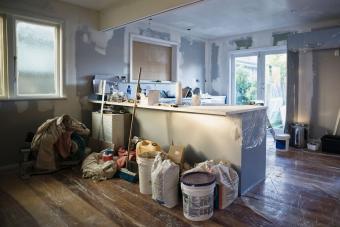
If you'll be leaving your home for an extended amount of time with no heat, make sure to drain water pipes for winter before you go. Undrained pipes may freeze and burst, causing significant damage to your home. Draining them will help to prevent this problem.
When Pipes Should Be Drained
The threat of frozen and burst pipes is a real one that too many homeowners have dealt with in the past. This threat may make you wonder when you should drain water pipes for winter in your home. Should you do it only if the house is uninhabited or whenever you go away?
The answer is anytime you will be turning off your furnace while no one is in the home during winter. If you are vacationing for two weeks, or you winter in the South, any time you decide not to heat the home is a reason for draining the pipes.
If you are leaving for only a few days and don't mind leaving the furnace on while no one is home, set the thermostat to a minimum of 50 degrees Fahrenheit. If you set it any lower, you risk the pipes freezing.
What Happens When Pipes Aren't Drained
Water flows whenever it has the option to. Even when your faucets are shut off, any water that flowed to that source remains in the pipe until the next time it is opened. Additionally, you will have water in your hot water tank, water filtration system, water softener and in the hoses that feed your kitchen sprayer or laundry sink.
When there is no heat in the home, and the temperature drops low enough, the water in these areas can freeze solid. Since water as a solid is larger than water as a liquid, it will expand as it freezes, splitting apart the frozen metal of the pipes. These burst and frozen pipes will often go undetected until the next thaw when the newly liquefied water runs out of the pipes, flooding your home.
How to Drain Water Pipes for Winter
Draining your water pipes is not a difficult job, but it is one where attention to detail counts. Any left over water is a potential source for freezing, so you'll need to make sure you cover all your bases.
- Shut down your water pump if you have a well, or have a plumber turn off your water at the street; do not leave water from the street to your home, as this can freeze just at the entrance to your home, causing even more problems.
- Turn on the water valves beginning at the lowest level of your home.
- Drain your hot water tank, water softening system or water filtration system.
- Move through the house turning all faucets and valves to the on position.
- Flush all the toilets and run both the shower head and tub faucet.
- Check all hoses running from sprayers or appliances. Move the hoses up and down to release any trapped water and remember to open any exterior taps.
- If you will be away for an extended amount of time, pour pipe-friendly anti-freeze down all your drains and toilets. Leave all the valves open in case of any water remaining inside that may dribble out over time.
Making sure you drain water pipes for winter when no one will be in the home can save you some major home repairs when you get back. If you'll be away for any extended amount of time, be sure to drain your pipes to avoid potential problems. If you will be leaving water in the pipes with the furnace set to a low temperature, arrange to have a neighbor check from time to time to ensure the furnace is functioning normally; in the event of a power outage, the valves and taps can be opened to allow the water to run freely and save it from freezing.







